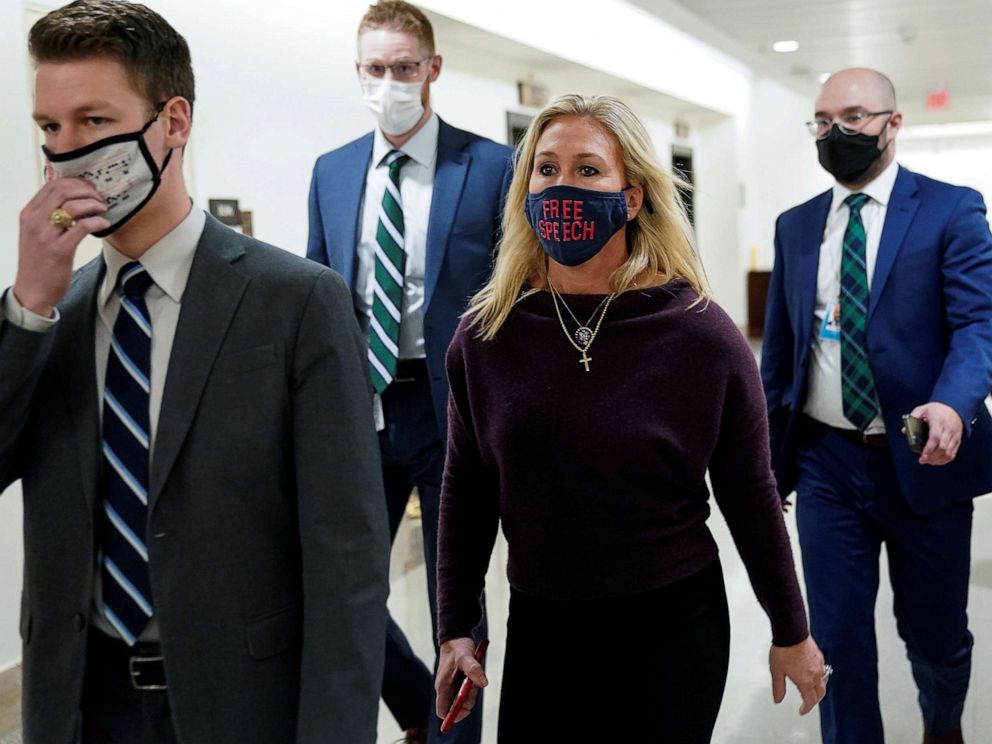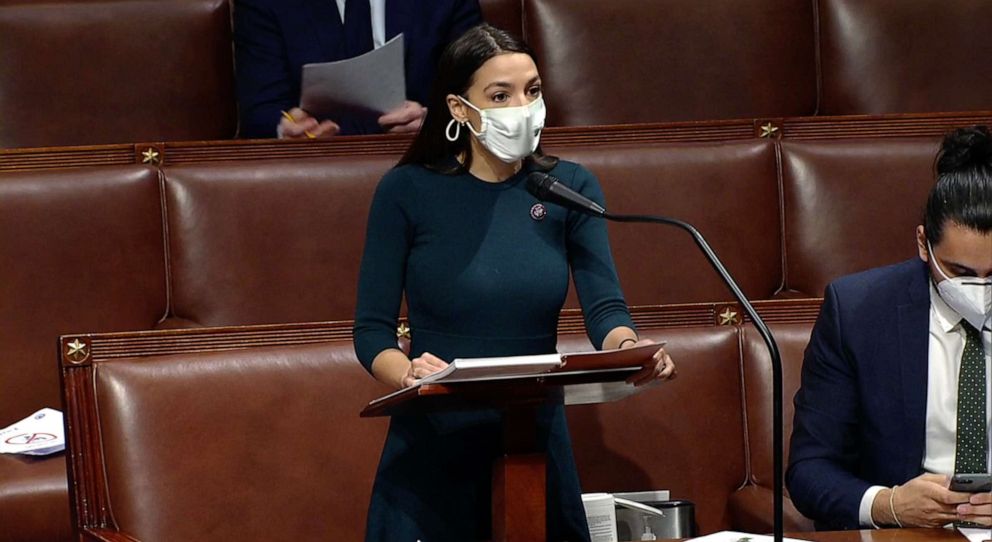Rep. Marjorie Taylor Greene sidelined but hardly silenced inside GOP: The Note
Greene could come out of this intense period of scrutiny as a political winner.
The TAKE with Rick Klein
Booting Rep. Marjorie Taylor Greene from congressional committees was the easy part, even if it took a first-of-its-kind vote on the House floor to make that happen.
Taking away Greene's influence is another story entirely. Grappling what she represents -- not to mention what former President Donald Trump continues to mean to the Republican Party -- will be near-impossible from here.
The uncomfortable truth is that, just as Trump is headed for likely Senate acquittal on impeachment charges next week, there is no effective mechanism for Congress to police its own in the context of the politics of 2021.

Influence is accrued and recognized based on Twitter followers and fundraising prowess more than committee assignments in many ways. Greene, R-Ga., could perversely come out of this intense period of scrutiny as a political winner; Trump's continued backing alone could easily outweigh the disapproval of the 11 Republican House members who joined Democrats in taking her committees away.
In a few short days, the consequences of one big lie and countless small ones will go on trial in the Trump impeachment proceedings.
This is about more than individual members of Congress and conspiracy theories they espouse, or about any isolated incident -- as horrific as it might have been. These are crises of misinformation that the biggest of tents can't hide.
The RUNDOWN with Alisa Wiersema
A lot can happen in the span of a decade -- about nine years ago, Mitt Romney was running a campaign that aimed to prevent President Barack Obama and Vice President Joe Biden from having a second term in office. Now, as a senator in a hyper-partisan landscape, Romney is indicating a rare move toward bipartisanship with the Biden administration.
On Thursday, Romney proposed "The Family Security Act", which would give families as much as $350 per month per child in an effort "to provide greater financial security" during the pandemic and beyond. The plan, which would replace the Child Tax Credit, would also cover expecting parents with coverage kicking in mid-pregnancy and promises to "immediately lift nearly three million children out of poverty, while providing a bridge to the middle class."

"American families are facing greater financial strain, worsened by the COVID-19 pandemic, and marriage and birth rates are at an all-time low. On top of that, we have not comprehensively reformed our family support system in nearly three decades, and our changing economy has left millions of families behind," Romney said in a statement.
While Romney's plan says it would work "without adding a dime to the federal deficit" it also echoes past Democratic stimulus efforts that sought to expand the child tax credit into monthly payments.
Amid ongoing negotiations over pandemic relief, Biden's chief of staff Ron Klain signaled early support for the proposal. "Really looking forward to see what @SenatorRomney will propose here -- an encouraging sign that bipartisan action to reduce child poverty IS possible," Klain said in a tweet.
The TIP with Kendall Karson
Trump's refusal to testify under oath for the Senate impeachment trial next week might mark his physical absence from the proceedings, but there are many, many witnesses, who lived through the gruesome events of Jan. 6, looking to paint in vivid detail the ramifications of his role in the insurrection.
"Twenty-nine days ago, the glass in and around this very chamber was shattered by gunshots, clubs, individuals seeking to restrain and murder members of Congress," Rep. Alexandria Ocasio-Cortez, D-N.Y., said Thursday night, kicking off an emotional series of speeches from lawmakers detailing their experiences during the Capitol siege

Rep. Cori Bush, D-Mo., who was an activist in Ferguson, said she was brought back to her days protesting on the streets. "I remember thinking, if they hit these doors and come near my staff, my thought process was, we banging until the end. We've come too far." Rep. Dean Phillips, a Democrat from Minnesota, recalled urging his colleagues to head to the other side of the aisle to "blend in" with their Republican counterparts -- hoping the insurrectionists would "spare us" if they thought they were members of the GOP -- before realizing that "blending in" was "not an option" for his colleagues of color. He apologized to his "brothers and sisters" for never understanding until that moment his privilege.
Regardless of the outcome of the Senate trial, one after the other, the members underscored the lasting scar Trump and his divisive rhetoric left on the building and the democracy it serves.
"We're not doing this for ourselves," Rep. Sheila Jackson Lee said from the House floor. "I want this not to be about us, but the story needs to be told."
THE PLAYLIST
ABC News' "Start Here" podcast. Friday morning's episode features ABC News Congressional correspondent Rachel Scott, who has more on Rep. Marjorie Taylor Greene after Democrats voted to strip her of her committee assignments. ABC News' Conor Finnegan explains why President Joe Biden is leaning on the State Department as he lays out his foreign policy vision. And ESPN's D'Arcy Maine breaks down the Olympic pandemic playbook ahead of the Tokyo games this summer. http://apple.co/2HPocUL
FiveThirtyEight's Politics Podcast. In the just four years since former President Donald Trump took office, the Republican Party lost the House, Senate and White House. Its leaders also stoked wild conspiracy theories that spurred some supporters to commit violence at the Capitol. Now, factions of the party are fighting amongst themselves as they try to decide the best path forward. So what should the party do to sway voters in its direction, and does it include addressing the extremists and conspiracy theorists within its ranks? https://53eig.ht/2MWEqOY
WHAT YOU NEED TO KNOW THIS WEEKEND
- President Joe Biden and Vice President Kamala Harris receive the president's daily brief at 9:15 a.m. They meet with House Democratic leaders and chairs of the House committees to work on coronavirus relief at 9:45 a.m. Biden delivers remarks on the state of the economy at 11:45 a.m. Harris and Treasury Secretary Janet Yellen will attend. Later, Biden will travel to Wilmington, Delaware.
- White House COVID-19 Response Team holds a press briefing with public health officials at 11 a.m.
- White House press secretary Jen Paski and Council of Economic Advisers member Jared Bernstein hold a press briefing at 1 p.m.
- The vice president and treasury secretary hold a virtual roundtable with participants from local Black Chambers of Commerce from across the country to discuss coronavirus relief at 3 p.m.
- Sunday on ABC's "This Week:" The Powerhouse Roundtable discusses all the week's politics with former New Jersey Governor and ABC News Contributor Chris Christie, former Chicago Mayor and ABC News Contributor Rahm Emanuel, Dispatch Staff Writer and CNN Political Analyst Sarah Isgur and Fordham University Associate Professor Christina Greer.
Download the ABC News app and select "The Note" as an item of interest to receive the day's sharpest political analysis.
The Note is a daily ABC News feature that highlights the day's top stories in politics. Please check back Monday for the latest.




